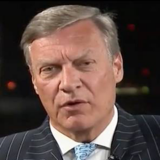Modern China is becoming more of a threat to the West with each passing day. The West needs to comprehend the radical and simultaneous transformations underway in China right now in order to confront the threat and emerge successful.
And China would be well advised to realize the nature and scale of the changes it has itself embraced and the consequences of an economic war with America.
The emerging, dynamic China, surely involves combating rampant corruption, enforcement of intellectual property laws, assistance by way of expertise on reforms, an open admission that its stale ideology is both wrong and dead, and the realization that consumers increasingly come first in China’s emerging “harmonious society.”
A new chapter is unfolding and China must be confronted without delay.
China has substantial problems. It isn’t necessarily the case that it magically can assume superpower status overnight, or even that China is America’s foremost enemy. It is simply time to recognize the facts and seize the day. There are many hard questions to ask about China. Here are the most pressing:
The Economic Growth Question
Is China’s boom of the past quarter-plus century extendable into the distant future? Or does China’s large and growing dependence on global markets mean that external markets could damage its economy by disrupting resource flows, obstructing market access, or slowing the growth of global demand for Chinese products as supply chains adjust?
Will international conflict within East Asia or over offshore oil deposits and islands or even conflict in the Middle East undercut China’s economic prospects? How can we mitigate such risks to global growth?
The Reform Question
Long neglected institutional deficiencies constrict seemingly promising growth prospects, as history has repeatedly proven. Is China’s modest reform, while broad and deep, uneven? Vital institutions affecting important clusters of activity in banking, land allocation, dispute resolution, and business regulation, exchange of property, corporate governance, capital markets, public finance, investment decisions and administrative structures surrounding these segments of China’s economy have witnessed only limited reform. How can China make progress on real structural reform over the coming decade?
The Intellectual Property Question
Large multinational companies and especially their CEOs are anxious to see results on the contentious issues of intellectual property protection in China. I personally have been sold copies of bootleg movies for 75 cents (repeatedly); purchased pharmaceuticals in a large drug store with the Pfizer label and logo that are not Pfizer products; bought imitation Vuitton and Ralph Lauren apparel; and discussed with a major beverage company how its designs were ripped-off in China in just days.
What should we tell global corporations about trademark and IP infringement in China? Is it worth doing business there without such assurances?
The Corruption Question
Widespread corruption, now often linked to transactions involving land in China and a vibrant black market, have tilted market outcomes toward select groups within the Chinese population and its all-powerful army. In recent transparency and opacity indexes for all countries, China has ranked very poorly. What can be done to combat more actively corruption and promote the rule of law?
The Finance Question
The dominance of China’s state-owned banks has increased since the 1990s, raising renewed questions and global concerns that non-performing loans are seriously worsening. The continuing unwillingness of the big state-owned banks to make loans to entrepreneurs limits the growth of private business and exacerbates China’s already serious problem of unemployment. How is China planning to avoid the kind of economic lethargy that affected Japan’s formerly dynamic economy for about a decade? Could it actually go bust?
The Information Question
Most in the world agree that as the aphorism suggests, “information is power.” While in China, articulate, young professionals repeatedly approach you asking if they could view BBC.com or CNN or surf the Internet in your hotel. They relay that Chinese authorities block many websites, including news sources. Why? What does China fear from the free flow of information, if its intention is to build a knowledge-based economy and populace? How does the looming fight over freedom in Hong Kong intensify this?
The America Question
How has China’s perception and understanding of America’s role in the world and the global economy shifted over the past few years? Is it China’s view that the American century has ended, and the Chinese century has begun? What is the role and responsibility of a superpower? Is China America’s friend or rival? Why is China building up militarily? Can the United States and China live in peace and cooperate together and for the good or is conflict inevitable?
The Ideology Question
Marxism-Leninism has been defunct as a philosophy for many decades in intellectual circles and since the collapse of the Soviet Union, and its empire no longer holds sway as an ideological system. What has China learned from the Soviet example and the void it left as a result? Must China be authoritarian and repressive to human- and especially religious rights?
China is also an increasingly consumerist society. Therein lies the contradiction. Is China likely to be a Communist country in 10, 20, or 50 years? How and employing what means? Could it also implode like the former Soviet Union?
China has met its combative foe in Donald Trump who has taken on all of these questions and is willing to challenge both China’s ascendency and its predatory unfair role in the global marketplace.
A new chapter is unfolding and China must be confronted without delay.

